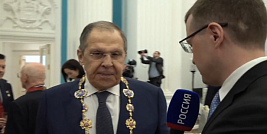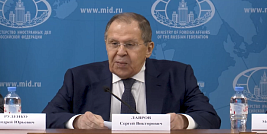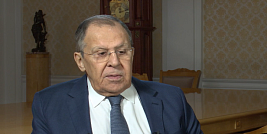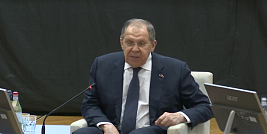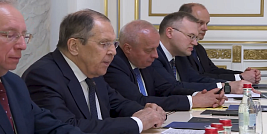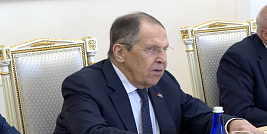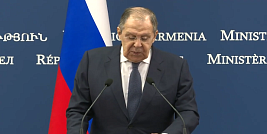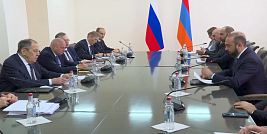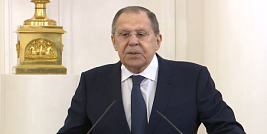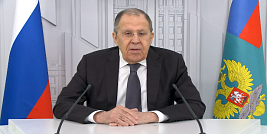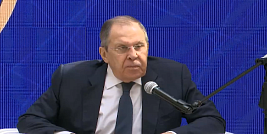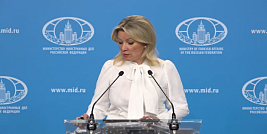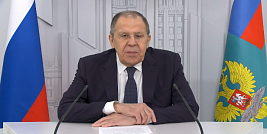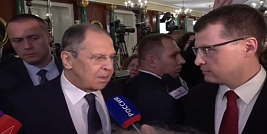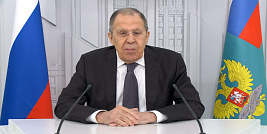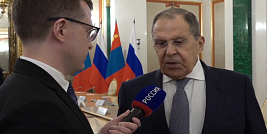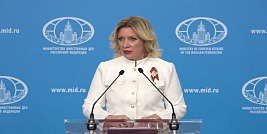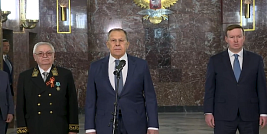Foreign Minister Sergey Lavrov’s interview with Kommersant, Moscow, April 14, 2025
Question: There were several rounds of talks with the United States since the new administration came to power there. What would be your assessment of how these contacts panned out? Have they resulted in outlining the key parameters for the future comprehensive agreement on Ukraine? On which of its elements have Washington and Moscow already reached common ground?
Sergey Lavrov: Let me answer your last question right away. The answer is no. Agreeing on the key aspects of the settlement is easy. We are discussing them.
Russia does not have any secrets in this regard. Speaking at the Foreign Ministry on June 14, 2024, President Vladimir Putin offered a clear outline of the principles for a lasting, reliable and fair settlement which would primarily focus on fulfilling the interests of the people and ensuring that human rights are respected, especially minority rights, as per the UN Charter. He said it all.
This is not some kind of a negotiating position. Let me emphasise once again that it is firmly rooted in the provisions of the UN Charter, as well as multiple conventions, while also based on the results of referendums. People in these territories, primarily in Donbass and Novorossiya, have spoken and expressed their will. I am referring to the four regions which held popular votes, in the presence of international observers, and took a decision in all transparency to rejoin their greater Motherland. In this case, this meant the Russian Federation.
As for the United States, we have already said that it has diverted from the path taken by the Europeans – and I cannot find a better way of describing their position than to call it frenzied, they have literally gone haywire in their frenzy, primarily the leaders in France, Britain, the Baltics, and several other EU and NATO countries. Unlike the Europeans, Donald Trump’s administration has been trying to get to the bottom of this issue and understand its root causes resulting from what Washington and Brussels did to bring the current regime to power by staging and sponsoring an anti-constitutional government coup in February 2014.
At the time, Victoria Nuland was in charge at the US Department of State for Ukraine under the Barack Obama administration. During one of the hearings at the US Senate she tried demonstrating the effectiveness of the administration’s policy by saying that the US spent $5 billion and this yielded results by bringing a friendly government to power in Ukraine. But it soon turned out that this was a Nazi government. Its first instinct in February 2014 was to violate the agreement they signed the previous day with the Germans and the French acting as guarantors under this deal. We will have to mention Germany and France many times during this interview if we are going to discuss the way the agreements approved by the Security Council were betrayed. The new authorities refused to create a national unity government and call an early election. Instead, they publicly announced the creation of what they called the government of the victors.
All these processes made the following events irreversible. What I mean is that, at the end of the day, military force is the only way to chase these demons from the government. The first instinct for putschists who invaded the Presidential palace and public buildings in February 2014 was to say that they were cancelling the Russian language’s status. By doing so they showed their true face.
President of the United States Donald Trump has said many times already that the decision by the Joe Biden administration to drag this country into NATO was a major mistake. Among other things, it served as a trigger, or one of the triggers, in terms of what is happening today in Ukraine. There were some promises before that, but when Joe Biden came to power, they started focusing on this agenda. President of the United States Donald Trump has recognised in public several times that he viewed this as one of the root causes.
When Presidential Aide Yury Ushakov, who was also part of the delegation, and I had a meeting with Secretary of State Marco Rubio and National Security Advisor Michael Waltz, we also discussed the second most important root cause which consists of an effort by the Nazi power as represented by Vladimir Zelensky and his supporters to root out and cancel everything Russian.
They killed many public figures, including journalists and civil society activists who advocated for preserving the Russian culture in the country. In fact, Russians played a decisive role in shaping this country. Not only did Russians assist this country for centuries, but also developed it and built cities like Odessa and many others, as well as ports, roads, factories and plants. And these people were literally exterminated.
From a legal perspective, judging by the laws Ukraine has today, they have cancelled everything Russian. They adopted several series of laws, about a dozen, long before Russia decided that it had no other choice than to launch the special military operation. And Donald Trump’s administration clearly understands this.
In particular, in one of his interviews, I think it was with Tucker Carlson, US Special Envoy Steve Witkoff said that these territories were home to people who held referendums and spoke out in favour of joining the Russian Federation.
NATO and denying people their rights – this is something that we cannot overlook. This is not a matter of territory. We are dealing with the rights of people who live on these territories. This is why this land matters so much to us. We cannot give it up and chase people from there. There have been proposals to expel Palestinians from the Gaza Strip.
Do people headed by Vladimir Zelensky who persist in hammering their message about the 1991 borders also want to expel people from these territories? Or do they want to restore their Nazi rule there so that everyone forgets their language, culture and history, and everything Russia has done for these territories? What they need is land as a bargaining chip. They have already sold something to UK Prime Minister Keir Starmer, and at a speculative price. So now they do not have anything left for the United States. They are profiteers for whom there is nothing sacred.
Recently, I was in Antalya for the Diplomacy Forum, where I quoted Vladimir Zelensky. He said in an interview the other day that he was motivated by hatred for Russians. When asked whether his hatred was directed at President Vladimir Putin alone, he specified that he hated all Russians collectively. Yesterday, Zelensky corroborated this in yet another interview.
We feel that the Americans are aware of this. More than that, the Americans acknowledge that something must be done about these root causes. I don’t even want to speculate that there is not a single normal individual in Europe. Of course, there are those who understand this, but they are forced to remain silent. Those who dare to speak the truth are, with minor exceptions, just Prime Minister of Hungary Viktor Orban, Prime Minister of Slovakia Robert Fico, and a few political scientists not belonging to the authorities.
The Americans, the Trump administration demonstrate an ability that sets them apart from those who do not want to think and simply appear on TV screens, urging Russia to stop hostilities immediately for one month. They say that they would “patch up holes” quickly and bring in some peacekeepers. A bright-eyed Mr Zelensky explained everything to them (his eyes are alternatively ablaze and “dimmed”), during a debate on peacekeepers, initiated by President Macron. Zelensky said that they needed fighting forces, not peacekeepers. Just send them arms quickly and militants from your countries, and they will jointly defend “Mother Ukraine.” I had to flesh out the details of our vision as regards who understands the situation with Ukraine and what it all entails.
If we go back to other aspects of the Russian-US dialogue, it is, of course, an uphill struggle to lift relations from the deep hole they are currently in after three years of free fall. This is especially true given the sincere desire to transition to normality shown by President Donald Trump and his team (we see that it is sincere), which is beginning to meet with resistance after a shock that has rocked the Washington-based elites (both Democrats and a portion of Republicans). They are preparing some moves behind the scenes, using their lobbies and the media. We read about this. They make no secret of this, as they want to prevent President Donald Trump from mending relations with Russia and putting them back on track as they should be between two great powers and between all countries, for that matter.
The UN Charter (which I never get tired of quoting) clearly states that the United Nations is based on the sovereign equality of states. But even before the UN existed, Western colonial powers never treated other nations as equals in their dealings. Can you name a single conflict since the establishment of the UN in 1945 in which the West, while actively intervening, treated the parties involved as equals? It never has. So restoring normality today is not such a simple task.
Take the relationship between the People’s Republic of China and the United States, for example. These two powers also have significant and deep-rooted disagreements. Perhaps the media don’t always cover these tensions in such stark terms, but China and the US are the two main – perhaps only – rivals competing for global economic and financial dominance. Just look at the current tariff war, which has become a struggle for survival.
They are also deeply divided on key geopolitical issues,especially questions of China’s territorial integrity: Taiwan, the South China Sea, the East China Sea and related territorial disputes. In all these cases, the US consistently takes the side of those opposing China’s claims.
Western countries have adopted an incredibly hypocritical stance on Taiwan. US administration officials and leaders across Europe publicly declare their adherence to the “One China” principle, yet in the same breath insist that no one has the right to change the status quo. But what is the status quo? In practice, it means treating Taiwan as an independent entity – arming it, signing separate economic agreements, all without any consultation with Beijing. This is the game being played today.
Just recently, Chinese representatives reaffirmed their strong commitment to resolving the issue of national reunification through political and diplomatic means. But they also warned: if the West continues provoking tensions and persuading Taiwan to abandon the peaceful path, China does not rule out other options.
These examples illustrate how deeply regional relations are being complicated by fundamental disagreements. And yet, despite these tensions, dialogue between Washington and Beijing has never been broken – neither under the Biden administration, nor under previous ones. Public spats and harsh rhetoric aside, no one in the US has ever seriously proposed cutting ties with China or isolating it. That’s simply unthinkable.
At the same time, Joe Biden positioned himself as Russia’s judge and mentor, a figure who hands down verdicts, makes them public and expects others to follow his lead.
Bringing our dialogue with President of the United States Donald Trump back to normal is a natural thing to do. What did create a sensation for many people was the lingering mentality inherited from Biden who wanted to make a new normal out of Russia’s total isolation. How incredibly silly. Of course, this did not work. The dialogue is recovering, even if this is not an easy process. Importantly, both sides are willing to move in this direction despite all the challenges and the fact that our national interests diverge on several, if not most of the international matters. We need to have meetings and to treat each other as well-educated and polite people by listening and hearing each other. This is what is happening right now.
There is an understanding on how to move towards bringing the operations of our embassies back to normal and how to resolve matters dealing with issuing visas to diplomats on time, including Russian diplomats working at the United Nations, who have a different status.
Under the previous Joe Biden administration, and before that under Barack Obama, and even during the first Donald Trump administration, the United States abused the fact that it hosts the UN Headquarters despite the fact that under all the applicable rules and as per the agreement Washington had signed with the United Nations, the Americans cannot prevent people from any UN member state from getting a job at the UN. We still have cases when employees approved by the UN Secretariat cannot travel to where they are supposed to work because the US refuses to issue them visas. People have to wait for several years.
When the Joe Biden administration made transferring funds to our embassy challenging, we responded in kind. Today, there are finally reasonable people in the administration. They replaced Biden’s appointees who either left or were relegated to the background. These new people are working with us to address the most basic issues dealing with the day-to-day operations of our diplomatic missions in our countries, considering that we have not severed our diplomatic ties. The fact that we must deal with these matters is quite absurd, but still…
The economy and trade constitute the third track. Americans mentioned it at the first stage when President of the United States Donald Trump and President Vladimir Putin had their first telephone conversation, as well as when Presidential Envoy Steve Witkoff came here, and when Kirill Dmitriyev, who heads the Russian Direct Investment Fund, was in the United States. They are businesspeople. Generating tangible returns is something that matters for them, and Donald Trump has made no secret out of it. This is his mindset and his policy. This is what the people of America voted for. It is obvious that they seek to generate benefits.
As for Europe, the Americans want to spend less on NATO, primarily by trimming spending on US troops and their contribution to protecting other NATO members. The US is looking at trade balances, depending on whether it has a surplus or a deficit, and what taxes these countries impose on various investment projects. This is all happening, even if in a somewhat chaotic manner. This is how it goes. This is the policy as adopted by the elected President of the United States.
They have always cared about the economy, and we could see this during the first Trump term too. It will all depend on how they intend to revive economic ties. We reached a record high of $34 billion several years ago, but now 90 percent of this trade is impossible due to illegal sanctions.
If you have been following the debates in Russia, you will know that we are not begging anyone to cancel these sanctions. We have a solid group of opinion leaders who believe that cancelling sanctions would be a disaster, since liberally minded officials would instantly seek to cut short and reverse everything we achieved in terms of import substitution, promoting economic sovereignty, developing manufacturing and ensuring security in sectors which are vital for the state, including defence, food security and technological sovereignty. There is a growing fear that these cunning Americans will lift sanctions all of a sudden in order to flood our market with services and technologies which had already caused so many challenges for us before.
We have yet to address the situation we have with civilian aircraft. They must undergo dual registration, and there are challenges with obtaining parts and engine maintenance. They have been telling us that they would not give us anything, saying that our aviation sector must die. I do not think that a reasonable person would want this to happen.
Let me reiterate that I am totally convinced that President Vladimir Putin was spot on in his multiple statements when he said that we cannot allow ourselves to depend on someone else in sectors which are vital for the survival of our state. During his recent appearance at the congress of the Russian Union of Industrialists and Entrepreneurs, he said that if anyone who ceased their business operations in Russia after being told to do so by their governments would want to return to Russia, we will have to see on a case-by-case basis whether there is a niche for them. They have created these openings when they withdrew from the Russian market, so these niches do not belong to them. In many cases, Russian businesses and companies from countries which decided to stay here have filled these niches by continuing to honour their obligations in terms of offering jobs to our people and fulfilling plans to supply their goods. Markets have already factored these projections into their plans, but it all fell apart.
I believe that if I had to pick sides in the dispute between those saying that by all means sanctions should not be lifted and that this would make things worse, and those arguing that otherwise Russia would become isolated from the global economy, I would side with the first point of view. Arguing that we would face autarky, or isolation, would be too much.
In fact, there is no such thing as globalisation in the world economy anymore. They destroyed it. It was not Donald Trump who did it but Joe Biden by imposing sanctions and using them as his one and only foreign policy tool. But we were not alone. Russia faces a record-high number of sanctions. Over one half of countries around the world face sanctions and various restrictions. China, Iran and Venezuela are the biggest beneficiaries in this regard. That said, there are over 100 countries facing unilateral US sanctions in one way or another.
The fragmentation of the global economy did not start today. It has been going on for quite some time now. Of course, Joe Biden accelerated this process by weaponising the US dollar and using it against the innocent. They did not have any talks with a country whenever they believe that it fails to abide by democratic norms. They prevented these countries from carrying out transactions in dollars, created barriers, but these countries found ways around them, so the US tried blocking these workarounds. This brought about a trend to create alternative payment platforms. Settlements in national currencies became increasingly popular. After all, Donald Trump had a reason to designate Joe Biden’s effort to weaponise the dollar as a crime, or worse than a crime, and a mistake. He made this statement both before and after the election. This undermined confidence in the dollar as a payment vehicle and created a train-wreck-waiting-to-happen situation.
Donald Trump has also expressed concern over BRICS creating its own currency. If this happens, he said, he would impose sky-high tariffs on BRICS. This proves that he understands the dollar’s role in the world and the role of hard currency in general in giving the US its leading role. With these tariffs, there were some who lost $50 billion just because of the way logbooks and computers responded to these developments. This was their response to the new everyday reality when learning that someone would charge them. Globalisation proved to be unsustainable as a virtual process. There are all these futures contracts traded on stock exchanges, only to crumble all of a sudden, creating a tragedy. We are about to get over this period.
Question: You are saying the new US administration is willing to discuss negotiated settlement in Ukraine in addition to bilateral issues.
At a recent UN meeting on Ukraine convened in the wake of the strike on Krivoy Rog, a US representative made it clear that Russia’s continued strikes on Ukraine could thwart peace talks.
Several days later, a strike on Sumy followed. According to the Ukrainian side, civilians and children died. Does this mean Russia does not take the US warnings seriously?
Sergey Lavrov: Which exactly US representative made that statement after Krivoy Rog?
Question: The acting official US representative to the UN.
Sergey Lavrov: The United States has many official representatives. A US representative said something in Greenland recently and was asked to come back home and to start looking for a different job.
I’m not saying that this lady (I have no memory of her making the statement that you mentioned) deserves the same, but we are very well aware that outright lies dominated the approaches practiced by the West, Europe, and the United States during the Biden Administration.
Over the past couple of years, I have on several occasions brought UN Secretary-General Antonio Guterres’s attention to the fact that as chief administrative officer of the United Nations – the Charter describes his job that way – he must comply with Article 100 of the Charter and refrain from taking sides, but rather maintain a balanced stance and not follow instructions from any government.
I’ve known him for a long time. We’re on a first-name basis and have been working in various overlapping positions for decades. I told him that as someone in this office he cannot receive instructions from Western countries, but he is effectively following the Western countries’ instructions when it comes to the situation in Ukraine.
Now, again, after all the hullabaloo over “dozens of children and civilians dying in Sumy,” he made a statement to the effect that he was strongly in favour of stopping such violations of international humanitarian law, resolving the Ukraine crisis based of the UN Charter, and respecting Ukraine’s territorial integrity in line with the UNGA resolutions that address this matter.
International humanitarian law categorically prohibits placing military facilities and weapons on the grounds under civilian sites. Since the earliest days of the crisis, and even earlier when the Minsk Agreements were in effect, and we were hopeful that they would bring a peaceful solution to the problem, leaving Ukraine’s territory whole minus Crimea (they were reluctant to do this), there were “a million” facts of artillery and air defence systems deployed in city quarters next to kindergartens. The internet was full of videos showing Ukrainian women yelling at the military telling them to clear out from retail outlets and playgrounds, but they keep doing so to this day.
We have facts about who was inside the building that was hit in Sumy. There was another get-together of Ukrainian military commanders with their Western colleagues who were there under the guise of mercenaries, or someone else. NATO military personnel are there and are directly in charge of the operations. Everyone is aware of that. The New York Times provided an account of the US military personnel playing a key role in attacks on Russia from the very beginning. Without them, most long-range missiles would have never been fired.
There is another thing I have been telling Guterres when he speaks about respecting the UN Charter and ensuring Ukraine’s territorial integrity. Why should Ukraine’s territorial integrity be ensured if its government does not represent Crimea, Novorossiya or several other territories that remain under the control of Kiev’s Nazi regime?
Before mentioning territorial integrity, the UN Charter calls for respecting the “principle of equal rights and self-determination of nations.” That principle provided the basis for the process of decolonisation, primarily in Africa. Yes, it took a long time – 15 years after 1945, but “the process gained traction” eventually (as one of our leaders used to say) at the initiative of our country. It has reached the final stage but is not finished yet. There are 17 non-self-governing territories, which is a gross violation of the relevant UN decisions. France and Britain control most of them.
President of France Emmanuel Macron is foaming at the mouth to demand Russia’s compliance with the UN Charter and respect for international law. But he says nothing about the fact that France is keeping part of African territories contrary to UN General Assembly resolutions and the will of several African countries. The French probably like to spend their holidays there. After all, it’s beautiful, and there are palms. You won’t see this in Paris, which is dirty and criminal.
We keep telling our friends at the UN that when they insist on solutions in keeping with the UN Charter, they should (in their capacity as the chief official) address its principles in their entirety and as a whole.
There is a simple connection between the principles of self-determination and territorial integrity. The UN General Assembly resolution, which was adopted as the Declaration on Principles of International Law concerning Friendly Relations and Cooperation among States in 1970, called for respecting the territorial integrity of all states who are conducting themselves in compliance with the principle of self-determination of peoples and are thus possessed of a government representing the whole people belonging to the territory.
Does Zelensky and his gang represent the territory of south-eastern Ukraine? They don’t, and they never did. When the UN Secretary-General says that the Ukrainian crisis must be settled on the basis of the relevant resolutions, he is referring to the Russophobic and extreme resolutions that have been adopted over the past three years by those whom the West blackmailed, threatened and forced to do its bidding.
The resolution I have mentioned, on the governments that represent the whole people belonging to the given territory, implies the principle of consensus, which is still in force.
We spoke about the legislative elimination of the Russian language and the recent law banning the canonical Ukrainian Orthodox Church, a sister of the Russian Orthodox Church.
Article 1 of the UN Charter says that all states must promote and encourage respect for human rights and for fundamental freedoms for all without distinction as to race, sex, language, or religion. The language and religion are directly mentioned in the UN Charter, which our Western colleagues don’t care about. This means that the West, considering its representation in the governing UN bodies, doesn’t care about it either.
We will continue to prove our point. The truth is on our side.
Question: Don’t you think that these two principles – the right of nations to self-determination and the principle of territorial integrity – are fundamentally incompatible?
I see your efforts to reconcile them and to justify Russia’s actions by appealing to one of these principles. But the other side still doesn’t agree with us, and that makes it difficult to reach any kind of consensus.
At one of the plenary meetings attended by President Vladimir Putin, President of Kazakhstan Kassym-Jomart Tokayev of Kazakhstan made a similar point. He warned that if the world were to follow only the principle of national self-determination, we’d immediately see around 650 irreconcilable conflicts flare up across the globe. What needs to be done to address this?
Sergey Lavrov: What’s needed is honesty.
I remember President Tokayev’s remarks. I disagreed with him at the time, and we later explained our position to our Kazakhstani friends. He considers territorial integrity the only relevant principle. But as I told him, if Kazakhstan is a member of the United Nations, then it must respect the UN Charter in its entirety.
I cited the example of decolonisation. The principles laid out in the Declaration on Principles of International Law concerning Friendly Relations and Cooperation among States in accordance with the Charter of the United Nations were put into practice. Specifically: territorial integrity is respected only in states whose governments represent the entire population living within that territory. Paris, Lisbon, Madrid, London – none of these colonial powers ever represented all the people living in the territories occupied by the colonisers. That doesn’t even need to be proven. That’s why the decolonisation process unfolded in full conformity with the UN Charter.
The Nazis and nationalists in Kiev do not represent the families of those whom they burned alive in Odessa, or the children they tortured and killed in Donbass – memorialised today in Donetsk’s Alley of Angels.” Nor do they represent the families of those killed in early June 2014 in central Lugansk during air strikes by military aircraft.
International humanitarian law clearly prohibits the use of a country’s own armed forces against its people in the context of internal conflicts. And I could go on with more examples.
Just look at how people who spent the ten or so long years under the Nazi yoke (I can’t find a different word) react when their villages are liberated. These are people who were robbed, whose homes were destroyed, whose livestock was taken, and whose women were raped.
Do you know why there will be chaos? Because when the colonial powers pulled out of Africa, they literally drew borders with a ruler – dividing ethnic communities, cutting them into halves, thirds, or quarters. Look at the Tuareg people today, living on both sides of the border between Algeria and Mali. There are countless similar examples: the Tutsi, the Hutu, and so on. That’s the legacy they left behind.
In its wisdom, the African Union decided that for now, countries should live within these inherited borders and try to work out agreements, establish neighbourly arrangements so that relatives can cross borders freely. Much like we used to do with our neighbours.
Question: All of these African tribes will start claiming their right to self-determination, and endless wars will ensue.
Sergey Lavrov: I’m telling you that, in its profound wisdom and being fully aware of the fact that this will cause even more bloodshed, the African Union has decided to steer clear of the disgraceful legacy left by colonisers and, in the vast majority of cases, no one is disputing these borders.
Question: So they are guided by a different point?
Sergey Lavrov: I understand that you hold dear the logic you are upholding. They are guided by the fact that they have exercised the right of nations to self-determination under the then existing circumstances.
And in their deep wisdom, they are unwilling to question those borders, even though the natural course of things (these places are home to different tribes) is causing occasional “clashes.” The power players who can get away with anything and who you are probably referring to do not believe that the right of nations to self-determination is tantamount to an invitation to chaos.
Kosovo. No one gave a hoot about Yugoslavia’s territorial integrity. No combat operations were underway anywhere near this region of Serbia by the time independence of this province had been unilaterally proclaimed. There was no threat to the people of Kosovo, and they didn’t need to be saved from anything. There was much more to it. Even before Kosovo declared independence, a resolution had been signed. The UN Security Council resolved to deploy Serbian police there and Serbian border guards on Kosovo’s external borders. They were totally unfazed by it. All they did was set the course for secession. There was no such thing as referendum in Kosovo. Instead, a UN representative, former President of Finland Martti Ahtisaari disgraced himself by coming forward and saying that Kosovo was now independent. No referendum, nothing. The Americans told him to do so, and he complied.
How was the right to self-determination exercised in Crimea? We gave them enough space to freely hold a referendum attended by several hundred observers. No, they did not represent Western governments, but they represented Western parliaments and parliaments from other continents. The West retorted wondering what right to self-determination we were talking about. They said, no, you can’t do that since you are Slavs, not Albanians.
Lots of documentaries about the Great Patriotic War are now screened. This deep-running racism is reminiscent of how the “master race” treated the Slavs. I’m observing the unfolding developments. It didn’t go anywhere. Just listen to what Friedrich Mertz is saying.
Eight to ten years ago, when I discussed various general geopolitical topics with my German counterparts, they sent me a message. Do you know what kind of message they were trying to get across? They said they had fulfilled their obligations to us and everyone else a long time ago and that they owed nothing to anyone and would proceed as they saw fit.
Here’s a concrete question that is part of the same narrative. The Leningrad Siege survivors of Jewish lineage received one-time payments from the German government on several occasions. In response to our numerous inquiries - this thing has been going on for 15 years or so now - what about those who, next to the Jews, froze in horrendous conditions, drove their children from place to place on sleds, and ate each other? They, too, survived, just like the Jews. Don’t they deserve equal treatment?
President of Germany Frank-Walter Steinmeier (he served as Foreign Minister back then) told me that Germans have a separate law about Jews (Holocaust), while siege survivors are ordinary participants of the war and are not eligible for one-time payments. The Germans had paid the contribution, case closed. I told him that since it was part of the Holocaust, it applied to all siege survivors. The Jews are part of the Holocaust not because they are Jews, but because they were tormented. What I got in response was a categorical no. Instead, he suggested building a hospital in St Petersburg and creating a centre for the participants of the war to meet and “to make peace.” We said it was not a bad idea, but the most important thing was not to display racism against siege survivors. They said it was out of question.
We told them that if they want to build something in St Petersburg, they are welcome to do so, but siege survivors live all over the world, not only in Russia, and not only in St Petersburg. Still, we got a flat-out no in response. This can be seen in Friedrich Merz’s statements and many other things, which is sad.
For us, of course, the future of the people is what matters most, and saying the territorial integrity of Ukraine cannot be violated means letting Russians, the Russian-speaking people who escaped from the Nazi regime end up at the mercy of these beasts.
We started with stating that the Americans are aware of the underlying causes. One of them is the absolutely Russophobic approach, which is enshrined in law, and in parallel, in the context of the fact that the Americans are beginning to get a grasp on the root causes, they are already talking about territories. Steve Witkoff said there had been referendums on four territories. That needs to be acknowledged.
Keith Kellogg (also President Trump’s special envoy) said the issue of peacekeepers was widely discussed. They should be deployed beyond the Dnieper, meaning that on this side of the Dnieper things should be accepted as they are and there will be no territorial integrity there. There will be, or rather has already been, self-determination of the people. He proposes establishing “zones of responsibility” on the right bank of the Dnieper, something like Berlin after the Second World War. His statement caused much noise and yelling.
UK Prime Minister Keir Starmer and President of France Emmanuel Macron are obsessed with this idea of peacekeepers and are busy cobbling up a coalition of the willing. Sure enough, the Baltic States are onboard with this idea. There’s no way they could stay away from it.
However, most of the EU and NATO countries aren’t too enthusiastic about it. They say a line of contact is a good thing. Putting an end to the conflict is what matters most. But they are still postponing the political settlement for later.
This is where our President’s questions become relevant: what are you going to do if this ceasefire is suddenly hypothetically “announced” without a lasting settlement? Are you going to arm and to help forcibly mobilise poor Ukrainians, who are being chased and snatched from toilet stalls in front of their mothers and stuffed into the Territorial Recruiting and Social Support Centre vans?
Vladimir Zelensky said they needed combat units rather than peacekeepers. That’s a blunt statement. However, French President Macron and British Prime Minister Starmer are into a game of words. They have come up with the term “resilience forces.” That is, in order to preserve Ukraine’s “resilience”, they will now put behind them “civilised” military units from Western countries rather than barrier troops, which the Ukrainian army is accustomed to. The question is what are they going to guard? Is it the same regime? No one is even mentioning elections.
However, the Americans said not long ago that elections must be held, but Europe will do everything to make sure the regime remains the same. Maybe, they will find a new half-baked führer who will be less dependent on substances, but deep down the regime will remain unchanged.
I keep asking people the following question at various events. I asked it in Antalya a few days ago: When you come to grips with the inevitability of preserving Ukraine within its “truncated” borders, how do you see the regime of “truncated” Ukraine? Will you force them to repeal the laws that ban the Russian language across the board? This state of affairs does not exist anywhere. Even in the harshest times of occupation of the Palestinian territories, Israel never banned the Arabic language, and things have remained that way to this day. However, in Ukraine, things are like that, and they can get away with this state of affairs.
Instead of taking this species (remember how he calls Russians?) down a peg, Ursula von der Leyen made a dramatic statement saying Ukraine should be given the last thread, the last gun, and the last bullet (Vladimir Zelensky could use it for sure), all and everything for him to defeat the Russians, because Zelensky and his army are defending European values. No one is Europe seems to disagree with that.
All of the above peacekeeping “arrangements” painted by “macrons” and “starmers” seek to preserve at least a small piece of land as home to the blatantly Nazi and Russophobic regime designed to be used for preparing another war against Russia (just like the Minsk agreements). This poses a major challenge for the West’s reputation and credibility.
Question: Over the past few years, both Vladimir Putin and you have emphasised in your public speeches that our Western partners are unreliable in such negotiations. Moreover, they also emphasised their own unreliability in the end.
Sergey Lavrov: We emphasised it; they proved it.
Question: And they admitted it too, to put it bluntly. How do the current talks differ from the previous ones? Why can they suddenly be trusted? Do you think this can be justified in terms of common sense?
Sergey Lavrov: There is one difference, in terms of common sense. Which, by the way, is Donald Trump’s slogan. He always says that he is guided by common sense. This showed when these people came and said: we do have numerous problems and disagreements with you, but not talking is a stupid policy we inherited from the previous administration. I think (I already said this) that was normalcy, just basic human normality, and we are not going to reject it. On the contrary, we think it is important.
I will tell you that when Presidential Aide Yury Ushakov and I met with US Secretary of State Marco Rubio and US National Security Advisor Michael Waltz in Riyadh, they were the ones who invited us and they began to talk, and their keynote was that common sense is important for President Donald Trump.
His foreign policy is a policy of America’s national interests. At the same time, he recognises that other countries (especially major powers) also have their own national interests, which are not always in tune with the national interests of the United States, and frankly speaking, in most cases they are not. However – importantly – as responsible international players, Russia, the United States or any other significant country must take action, in situations where national interests do not align (in most situations, that is), to prevent this misalignment from degenerating into confrontation. In other cases (few as they are), where interests do align, it is their responsibility to take the opportunity and translate this convergence of interests into mutually beneficial material, economic, technological, transport and logistical projects.
I believe that this is a pragmatic approach and it is worth discussing. I do not know what will happen four years from now, when another administration takes over. Some suggest to purchase Boeings again. Suppose we do. But who knows how the situation will change in four years? What if they end up grounded and idle again, while we disassemble them for spare parts? Four years may be too long for planning now.
Political analysts both in Europe and Russia write that in a year and a half, the US will hold midterm elections where the Democratic Party will move heaven and earth to prevent [Republicans] from winning a majority in Congress. But that is coffee cup reading.
Now that we are being offered normal deals (using Donald Trump’s terminology), we take it in a good way. We know the difference between a mutually beneficial deal – something we never rejected – and a deal that could drive us into another trap.
The prevailing view in our political class is that we must never again allow any restoration of economic relations or other kinds of ties to put us back into dependence on any kind of ‘spare parts’ in all spheres that are critical to the well-being and general condition of our state. This is what military, food, and technological security means. I am 100 percent certain that this lesson has been learned. President of Russia Vladimir Putin had a reason to say in the midst of the special military operation that we have learnt the lesson and will never be in the same situation as before February 2022.
This means that we tried to the last to find a compromise according to those rules. We proposed formalising agreements on security guarantees that we found acceptable – we proposed a specific treaty after [Vladimir Putin’s] Munich Speech in 2008, but NATO and the US rejected it.
Despite the rejection, in December 2021, we proposed two more agreements that could ensure the security of Russia, Europe and Ukraine without NATO enlargement. We were ignored. In January 2022, then US Secretary General Antony Blinken told me that Russia should not meddle with NATO. They basically said it was none of our business, and that they could think about agreeing to limit the number of medium-range missiles deployed in Ukraine – missiles prohibited by the treaty from which the US had withdrawn. That was it. That was the big concession. After we proposed the two draft agreements in December 2021 on the President’s instructions (after another speech he gave in November 2021 at the Russian Foreign Ministry), he still hoped to the last minute that we would be able to dissuade them from the downright destructive scenario of mindlessly dragging Ukraine into NATO. We know that even before 2014, there were plans to establish bases in Crimea. But after that, the issue of Crimea was already closed. However, the British were going to build naval bases and much more in the Sea of Azov. President Putin’s words that things will no longer be the same as they were until February 2022 mean that he hoped for a glimpse of common sense until the last.
Now common sense has filtered through in the White House. We will see how it goes.
Question: What will happen after the New START Treaty expires in February 2026? Do you think there is still time to develop a replacement? Or are we headed for an arms race?
Sergey Lavrov: Why would we need one? President Vladimir Putin has said clearly that we will never allow ourselves to be dragged into another arms race.
Question: So, will there be some sort of unilateral restraint?
Sergey Lavrov: Why would there be? We have our own policy, and we know how to ensure our country’s defence capability, even if the global strategic landscape remains unchanged.
Despite the apparent normalisation of relations with the Americans, they continue to label us an adversary in their official doctrinal documents and in public statements, even call us an enemy. That hasn’t stopped.
You can’t just cherry-pick one element from the New START Treaty – like the right to inspect each other’s nuclear facilities – and ignore the rest, just as you can’t do that with the UN Charter. The very first lines of the treaty state that it was only possible to conclude the agreement on the basis of mutual respect, equal security and the recognition of the interdependence between strategic offensive and defensive systems.
That interdependence was wrecked long ago – first when the US withdrew from the Anti-Ballistic Missile Treaty, and later from the Intermediate-Range Nuclear Forces Treaty. Since then, the Americans have been actively developing missile defence systems and intermediate- and shorter-range missiles, deploying them across the world, including Europe, Southeast Asia, as well as along Russian and Chinese border perimeters.
The Trump administration suggested discussing this issue in a trilateral format that would involve China. They haven’t proposed anything to us. And we won’t be the ones proposing anything either, because we are not the ones who dismantled the arms control framework, including New START Treaty. It was the Biden administration that rejected the foundational principles upon which that treaty was built. The Trump administration, for its part, has yet to return to those principles, although dialogue on various topics is ongoing.
We are self-sufficient. We have everything we need. We know how to maintain our defence capability. If the Americans feel that their nuclear arsenal is becoming outdated, especially in comparison to our modernised weapons, then perhaps they are the ones interested in closing that gap. We haven’t received any proposals to that effect.
The last time was when then-President Joe Biden asked for access to inspect nuclear facilities, including some used in connection with Ukrainian drone activity involving American-made equipment. The Trump administration said it was open to strategic dialogue involving the United States, Russia and China. But China isn’t interested in that format. And we haven’t received any bilateral proposals either.
If we do, we will naturally explain how we see a truly equal conversation, how we believe strategic stability should be ensured. But that’s still a long way off. We are not running around asking for talks. We didn’t walk away from any aspect of the process, whether it was economic relations, defence-related issues, the ABM Treaty, the INF Treaty, or anything else.
President Putin has said it many times: we’re not going to beg. If you don’t want to talk to us, fine – we’ll act accordingly and draw our conclusions. If you do want to return to dialogue, then explain what you are bringing to the table, and we’ll decide whether it suits us or not.
For example, the Americans proposed dialogue on the Ukraine crisis. We are engaging, and we have explained our position. The same goes for their proposal to restore normal operations at our respective embassies, and we support this, too.
Question: When will the US Embassy in Moscow resume normal operations? When will people be able to apply for a US visa in Moscow again?
Sergey Lavrov: When will Kommersant increase its circulation? Are you trying to pull off another five-year plan in three years? Wanting something doesn’t hurt – there’s a saying about that. The truth is, no process can be tied to a specific date.
Right now, people are saying there should be peace by Easter. Why? Because Finnish President Alexander Stubb feels like that would be right. He said as much after a round of golf at Mar-a-Lago, adding that [Russia] was their neighbour, they shared a 1,000 kilometre-long border, and therefore they would have to “restore” things. But three days before that he was shouting, with a practically rabid expression on his face, that “Russia should get the hell out” and vowing that they would never forget that Russia had taken thousands of square kilometres of their territory.
So, it turns out that what really troubles Mr Stubb isn’t the long history of peaceful coexistence with us, or the fact that Russia granted them independence, or that we explained why we needed to push the border away from Leningrad. All that, apparently, has been forgotten, including how their leaders used to relax in the sauna with their Soviet and later Russian counterparts, or even played hockey together.
Now it’s suddenly: “Russia violated everything by sending troops to Donbas as part of the special military operation, the veil is off, give us our territories back.”
So when people like President of France Macron who has publicly called us every name in the book, suddenly says, “At some point, we’ll have to talk,” and even hints that he’ll probably be Europe’s chief “negotiator”… Or when President Stubb, who shouted that Russia is the aggressor and took their land, turns around and says, “Eventually, we’ll have to normalise things”…
Well, if people think they can behave like that now, and then just wake up one day and decide it’s time to patch things up, they’d better be ready for us to think long and hard about whether the time has come – and under what conditions that “normalisation” might happen.
Indeed, no one is forgotten and nothing is forgotten– in every sense of the phrase.
Question: From what you have said, it sounds like Moscow still believes the US can be a negotiator in the Ukraine conflict. There have already been two US-mediated agreements: one on safe navigation in the Black Sea and another on a moratorium on strikes against energy infrastructure. But neither seems to be fully functioning. What’s your take on that?
Sergey Lavrov: There are no such agreements.
During a telephone conversation with President Putin on March 18, 2025, US President Donald Trump proposed a 30-day moratorium [on strikes on energy infrastructure]. Trump said that he saw why it was unclear how a ceasefire could be arranged.
Do you remember President Putin expressing our attitude to the idea of a 30-day ceasefire? How would these 30 days be used? For bringing more weapons to Ukraine, for mobilising tens of thousands of unwilling men (I don’t know exactly how many they would mobilise)? How will control procedures be organised to expose violations, since we know that Ukraine loves to lie and deceive? That’s why Trump proposed a 30-day moratorium on strikes on energy facilities.
President Putin immediately accepted the proposal and issued instructions on it during the conversation. It turned out that seven drones were heading towards Ukrainian energy facilities. We shot them down.
And another thing Trump said was that people should be allowed to discuss the Black Sea Grain Initiative, which should be relaunched. Such a meeting was held, and five issues were agreed upon, which the Americans have made public. We published a supplement to these five clauses, in particular, the paragraph which said that the Americans would facilitate the resumption of normal Russian grain and fertiliser exports in terms of insurance rates, port calls and bunkering, which are practical matters.
That is exactly what UN Secretary-General Antonio Guterres should have done three years ago when he signed the first Black Sea Grain Deal which consisted of two parts: Ukrainian grain and Russian grain and fertilisers. Antonio Guterres pledged to lift obstacles on the export of Russian agricultural products, fertilisers and grain. He has not done this. Knowing that he has not acted on his promise, we continued with these exports for the past three years, using other opportunities and other delivery routes. However, there is not enough grain and fertilisers on the market, which poor countries need to launch their own production of foods products and receive our humanitarian aid.
That’s why we said openly that it’s good that the United States has volunteered to facilitate Russian exports by lifting obstacles, just as Guterres did three years ago. The Americans have formulated their readiness to do so. But we know what dashed the UN Secretary-General’s hopes. That’s why we stated frankly what should be done if the US wanted to help, so as to prevent a repetition of the situation when a deal that was welcomed with great enthusiasm has come to nothing for Russia’s exports.
In principle, controlling our Ukrainian neighbours’ honesty is what we demand when discussing any schemes advocated by the West for “promoting a settlement.” Here are two of the most glaring examples. I have already mentioned May 2, 2014, when nearly 50 people were burned in the House of Trade Unions in Odessa. Ukraine (its president was Petr Poroshenko at the time) said it would investigate the matter. Nobody is investigating it. When the Council of Europe volunteered to help investigate that tragedy a year later, when Russia was still a member, it adopted a conservative decision, saying that it was ready to provide assistance to the Ukrainian government in investigating the massacre. After that, it dipped out, as it’s said. They have simply forgotten and don’t want to remember about it, although there are lots of video materials of those who set fire to the building and shot those who jumped out of windows. They have no interest in that.
For me, Bucha is the most striking example. The incident happened two days after our troops withdrew from it in late March 2022 as goodwill gesture prior to conclusion of the Istanbul agreements, which Boris Johnson eventually told Ukrainians not to sign.
For two days, there was no one else in Bucha other than the local authorities. The mayor of the town posed before the BBC cameras saying they had regained control of their small homeland. Two days later, the BBC came on the air with breaking news showing dozens of corpses, neatly laid out on the shoulder of the wide central street. Not hidden in some basements, or out-of-the-way spots, but strewn on the central street. Next thing you know, they cast it as Russia’s “murderous act” and our retribution to the Ukrainian people. The European Union, the Americans, and the Biden Administration imposed sanctions on Russia. The Russia-is-a-beast campaign lasted for three or four days.
Since then, we, and I personally, have been trying to obtain the names of the people whose corpses were pompously displayed by the BBC and later by all other channels. On two occasions, when I was in New York attending the UN General Assembly meetings and taking part in the UN Security Council sessions, I asked Antonio Guterres, who was sitting across from me at a round table, if he could be of any assistance in this matter. We are unable to get these names no matter how hard we try. They painted us as the culprits. Okay, an investigation is underway. But why not give us the names? We lost hope, and now we just want to see to what extent you are biased. Antonio Guterres looked the other way in embarrassment. He later told me one-on-one that it was not within his purview. I said there was the UN Human Rights Council, under which an “independent” UN Human Rights Monitoring Mission in Ukraine was created in violation of every UN procedure. We find it illegitimate, but it is still out there. We sent an official paper to the Human Rights Council asking for clarifications. It’s been three years since the Bucha incident, so at least give us the names. We have had no answer to this day. This is an official paper.
Whenever I’m in New York, and every time I give a news conference there, I tell everyone accredited with the UN (BBC, CNN, and everyone else) that they are reporters and they have a genre called “investigative journalism.” UN Secretary-General Antonio Guterres evades the question, and so does the UN Human Rights Council. Are journalists in a position to send a specific request to the UN? No one is doing anything.
I find the situation absolutely clear. I also understand how dangerous the self-determination of the peoples is. It is not dangerous in the slightest.
Nazis seize the lands that never belonged to anyone but the Russian Empire and the Soviet Union, and wreak havoc there, trying to make some “representations” to us.
Out of nowhere, they come up with a Budapest Memorandum. It says nothing about acquiescing to the unconstitutional coup that brought racists and avowed Russophobes to power. When they talk about the 1991 borders, these borders emerged by virtue of the Belovezha and then Alma-Ata “divorce” of the former Soviet republics, based on the prevailing conditions available at that time. The Declaration of Independence of Ukraine, which was adopted a year before, was one of the key prerequisites for us, the RSFSR, at that time. It clearly stated that this country would remain neutral forever and would not be joining any military blocs. Later, this postulate was enshrined in the Constitution of Ukraine. It was the right thing to do. Their Constitution said that the state of Ukraine guarantees the rights of the Russian (a separate mention) and every other ethnic minority. Despite all the “draconian laws” that I mentioned earlier, this provision was preserved in the Constitution of Ukraine. The “joining NATO” provision was made part of the Constitution later. We recognised independence of Ukraine as a neutral, friendly, and non-aligned state in which “the rights of the Russian and other ethnic minorities” enjoy full respect.
